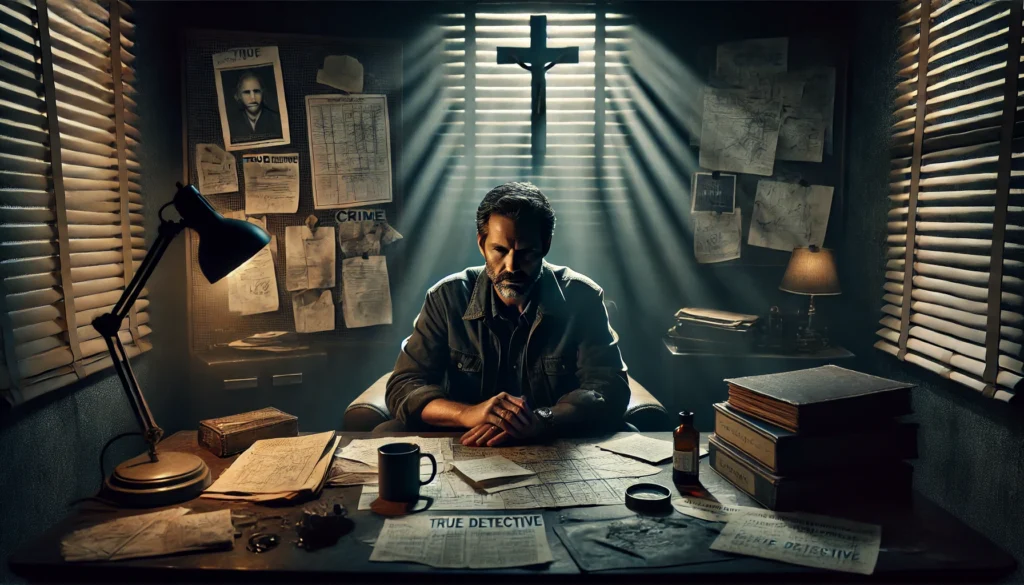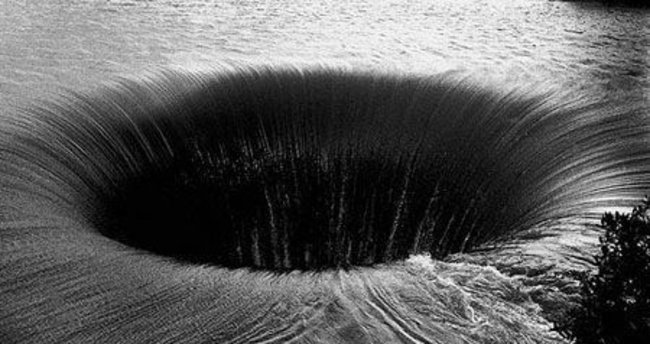In the dark atmosphere of True Detective, Rust Cohle stands out as a pessimistic detective who believes in the meaninglessness of existence. Nihilism shapes his worldview, leading him to predict a grim future for humanity. But where will Cohle’s dark philosophy take him? This character, who questions the meaning of life, invites both the series and its viewers on a profound philosophical journey.
A Disillusioned Man: The Philosophy of True Detective
Some stories leave a deep impression on a person’s life. These stories reveal the questions lingering in one’s mind, almost as if translating their thoughts into words. The first season of True Detective had this effect on me. The series tackles profound questions about evil, human nature, and the afterlife. Rust Cohle, one of the show’s main characters, draws attention with his dark and profound philosophical outlook on these questions.
Rust’s Pessimism
Rust views life through an extremely pessimistic lens. To him, humanity is the result of an evolutionary mistake, and our consciousness only brings us suffering. Humanity, according to Rust, is merely an emotional being enslaved by its desires. This bleak outlook stems not only from his profession but also from his personal tragedy. While his job as a homicide detective exposes him to the darkness of human nature, the foundation of his despair lies in the tragic loss of his daughter in a car accident. After her death, Rust sees the world as an even worse place and copes with the pain by convincing himself that “the world’s cruelty means my daughter’s death was actually a good thing.”
Antinatalism and Critique of Religion
Rust views having children as bringing another life into this painful world, an act he strongly opposes. To him, existence in this world is nothing short of torture. He also harshly critiques religious people, believing that faith blinds them to life’s harsh realities. Ironically, a cross hangs in his room, suggesting a subtle connection to the Christian concepts of suffering and salvation. While Rust does not believe in an afterlife, he sees death as a form of release—a way to escape this world of pain.
The Contrast Between Marty and Rust
Rust and Marty are polar opposites. Marty is more social and lively, while Rust is his antithesis. Yet, Marty harbors his own contradictions. Despite claiming to value his family, he cheats on his wife and pays the price for it later in the series. Marty struggles to cope with the darkness of their work, resigning after witnessing a horrific infanticide. Rust, on the other hand, already entrenched in despair following his daughter’s death, sinks further into hopelessness as their cases unfold.
The Problem of Evil and a Cosmic Battle
In True Detective, evil is portrayed not just as an individual or organization but as a cosmic force. Rust believes this evil is omnipresent and intrinsic to human nature. The series’ serial killer and his cult are part of a generational chain of malevolence. Rust and Marty are not merely hunting a murderer; they are waging a battle against this cosmic evil.

An Optimistic Ending?
In the end, Rust and Marty succeed in capturing the serial killer. After emerging from a coma, Rust shares a mystical experience with Marty, involving a sense of connection with his deceased daughter and father. Rust, who has lived his life through a strictly rational lens, begins to embrace a more romantic optimism. He accepts that the battle between darkness and light will never end but feels that the light is beginning to prevail—a shift that softens his stance toward life.
Despite his profound pessimism, Rust’s character reveals the complexity of the human spirit and demonstrates that even the most rational individuals can experience emotional contradictions. True Detective offers no definitive solutions but paints a far more intricate picture of life than initially expected. Good and evil are not just external forces but are in constant conflict within individuals themselves.
The Philosophical Core: Time and the Eternal Cycle
Rust’s views on time form a cornerstone of the series’ philosophical depth. He sees time as a circle, with events repeating endlessly, leaving nothing truly changed. This reflects a nihilistic perspective on the cyclical nature of life and humanity’s inevitable confrontation with pain and evil.
However, Rust’s bleak philosophy is shaken by the series finale. After the climactic conflict, his mystical coma experience provides him with a new perspective. The connection he feels with his daughter and father leads him to believe in a form of continuity, at least through the spirit. This moment transforms Rust’s outlook, and for the first time, he exhibits an optimistic view of life, declaring, “Once, there was only darkness. But now the light is winning.”
Rust’s Inner Victory
This transformation marks the pinnacle of Rust’s character development. Despite his belief in life’s meaninglessness and pain, his coma experience opens a door to a greater search for meaning. In the end, Rust acknowledges that life and human experience are not entirely devoid of light, and he perhaps finds a reason to hold on.
This perfectly encapsulates the philosophical depth of True Detective’s first season. While acknowledging that the battle between good and evil, light and dark, has no definitive end, the series encourages viewers to reflect on their roles in this struggle. Despite Rust’s nihilism, his eventual glimpse of hope represents one of the show’s greatest ironies. Ultimately, the fight continues, but humanity can still strive to find meaning in the chaos.
Conclusion Rust and the Struggle to Connect with Life
The first season of True Detective is more than just a crime story; it lays the groundwork for a profound philosophical discussion. Rust’s dark and nihilistic worldview forms the series’ foundation, while his transformation offers viewers a fresh perspective on life. Evil may exist everywhere, but humanity can find light in the darkness and cling to it to move forward. Rust’s ultimate triumph is not over external forces but within his own inner world.
